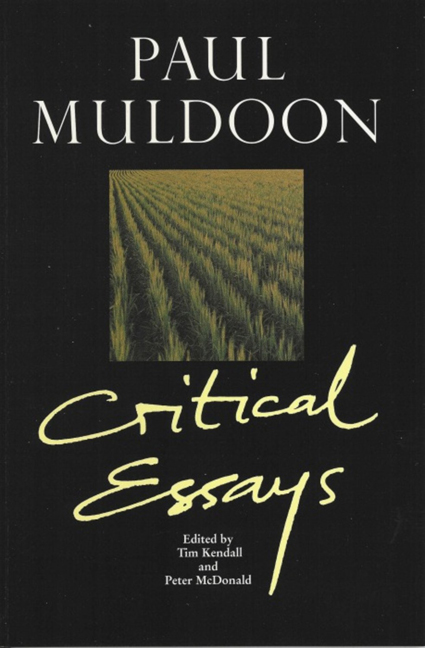Book contents
- Frontmatter
- Contents
- Acknowledgements
- Notes on Contributors
- Introduction
- ‘Thirteen or Fourteen’: Paul Muldoon's Poetics of Adolescence
- Never Quite Showing his Hand: Robert Frost and Paul Muldoon
- For Father Read Mother: Muldoon's Antecedents
- Pax Hibernica/Pax Americana: Rhyme and Reconciliation in Muldoon
- Muldoon and Pragmatism
- ‘All That’: Muldoon and the Vanity of Interpretation
- Paul Muldoon's Transits: Muddling Through after Madoc
- ‘All Art is a Collaboration’: Paul Muldoon as Librettist
- Muldoon's Remains
- Index
Muldoon's Remains
- Frontmatter
- Contents
- Acknowledgements
- Notes on Contributors
- Introduction
- ‘Thirteen or Fourteen’: Paul Muldoon's Poetics of Adolescence
- Never Quite Showing his Hand: Robert Frost and Paul Muldoon
- For Father Read Mother: Muldoon's Antecedents
- Pax Hibernica/Pax Americana: Rhyme and Reconciliation in Muldoon
- Muldoon and Pragmatism
- ‘All That’: Muldoon and the Vanity of Interpretation
- Paul Muldoon's Transits: Muddling Through after Madoc
- ‘All Art is a Collaboration’: Paul Muldoon as Librettist
- Muldoon's Remains
- Index
Summary
I was almost going to say, ‘I accept the Universe!’
In a review of The Annals of Chile, Neil Corcoran puts his finger on the affective quality, the quidditas, of Paul Muldoon's elegy, ‘The Wishbone’: ‘exiguousness’. An exiguous thing is scanty or small. The wishbone at the end of the poem bears scant relation to the substance – ‘a frozen chicken’ – of which it had formed a part. According to Tim Kendall, such exiguous objects appear throughout Muldoon's poetry as ‘residuary bodies’, or, as Clair Wills puts it, the ‘remains’ of larger objects. In those poems Muldoon published along with ‘The Wishbone’ (in The Wishbone pamphlet, in 1984, and Meeting the British, in 1987), they stubbornly insist on presenting evidence of their origins. With often chilling exactness, the particular remains of natural and human substances are present in profusion throughout Muldoon's later domestic and pastoral elegies. These remains persist alongside the facts of absence and death.
In the sequence gathered in The Wishbone alone, places and parts of the dead, dying and deathly are contiguous with the small, scant, diminished or dismembered: a woman freezing to death in a Pennsylvania cranberry-patch, the shuttlecock lost in the bamboo growing over a Belfast cholera cemetery, a lover's arm turned knotted and ‘phantom’ by the weight of a loved one sleeping in its ‘crook’, a butcher's shop, a restaurant, two dead huskies, anthrax, smallpox, a ship fuelled by burning its own mast, musical instruments formed from a tree or a human bone, ‘two tiny birds, / one Pernod-sip, // one tremulous crème-de-menthe: / their tiny sobs’. For both the deathly and the exiguous, the poet reserves what John Kerrigan, speaking of Muldoon's ‘exactness’ has called the ‘cascading lucidity of detail which recalls Ovid's fluid precision’.
Such precision can even flow into the forensic, as in ‘The Toe-Tag’ in Meeting the British, with its ‘kid-gloves’, ‘hides of stillborn calves’, ‘a month-drowned Aranman's geansai’, and the ghastly surreal vision in a garden centre, ‘the orangery's body-bags / of peat’ (P, 171). The music of the line rolls ‘orangery's’ round the mouth, pulls us up with a shock at ‘body-bags’, and then plays across the line-ending to small relief, ‘peat’. With macabre precision, ‘The Toe-Tag’ also deals in small measures: ‘A jigger of blood on our swish organza’.
- Type
- Chapter
- Information
- Paul MuldoonCritical Essays, pp. 170 - 188Publisher: Liverpool University PressPrint publication year: 2004



